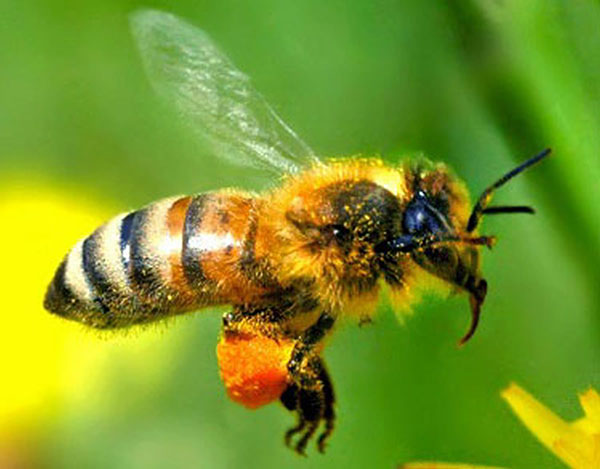
Why should bee hives be allowed on to allotment sites?
Honey bees – what are they? What do they do?
Bees have survived without help for millions of years. The English native black bees mostly disappeared in the early 1900’s, and were replaced by the more gentle and productive Italian types. However, in 1992 the varroa mite arrived from Europe, and now bees only survive if we treat them against the infestation. So hives kept on allotment sites are now important to help bees to survive, since wild honey bees have largely died out. (Bumble bees aren’t affected). The old native English bee seems more resistant to the mite (it is hairier) and efforts are being made to re-introduce it. However perhaps due to infections, monoculture, insecticides or new genetic weakness whole hives are simply collapsing. If the present rate of collapse continues it seems the USA would have no honey bees left by 2035, and so up to two-thirds of all current crops grown will then disappear.
Bees are pollinators. They are of immense value to agriculture, horticulture and gardeners. They pollinate crops estimated to have a value in UK of £7 billion per year. The days when Government officials could ignore beekeeping and fail to protect it are long gone. It is now essential for preserving our natural environment. Bee-keeping is not just increasingly popular, it is vital for gardening and food supplies.
ALLOTMENTS: how should bees be handled? and where should hives be sited?
Inevitably there are “do’s and don’ts”
DO NOT
Do not place hives where the flight lines taken by the bees will cross pathways or contact people working on their plots.
Do not allow beginners to keep colonies of bees on allotment sites unless they are supervised by an experienced beekeeper. – the local beekeeping association can usually help with this.
Do not handle or work with the bees when plot holders are gardening in that area.
Do not allow the bees to increase and swarm unexpectedly – manage the hives carefully.
NOW DO
Do place the hives away from the main area of the site and other plot holders
Do restrict the number of colonies
Do raise the take-off flight line to at least six feet. Use hedging, fencing or mesh around the apiary to make sure the bees fly up high as they leave, and do not cross other plots.
Do try to work on the hives only when the bees are very active, so that fewer remain inside, and make sure the beekeeper is accompanied so as to get help in an emergency
MANAGEMENT AND ADMINISTRATION AND INSURANCE
Any person keeping bees on allotments should normally be insured against public liability claims: beekeeping associations usually arrange insurance against claims for up to £10 million through the British Beekeepers Association. It may be necessary to insist that the beekeeper is a member of the local Beekeepers Association.
A person wishing to keep bees on allotments must have the agreement of the Allotment Managers and abide by any rules; and must show either that they are competent or that they will be properly supervised. One option for beginners is to attend a bee-keeping training course while under supervision. The beekeeper must show he/she has made adequate arrangements to ensure that any problems caused by their bees in their absence will be resolved.
Allotment Managers are responsible for policing the conditions on which bees are kept on allotments. Local Beekeeping Associations may have members available to offer advice if required, but cannot be responsible for any action by individuals or plot holders keeping bees on allotments.
INVITATIONS TO BEEKEEPERS, SALES AND COMMUNITY INVOLVEMENT
Allotment plots can always be rented to a beekeeper for the hives, especially where existing members are unwilling or unable to take up the hobby themselves. Sales of Allotment Honey can be profitable as well as attracting attention to the site; and the hives make an exciting visit and study for local schools, which can use them to encourage concern for bee conservation: they are another way forward for local involvement in allotments.